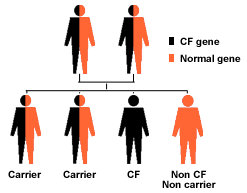| Home Page
About CF
History of CF
Symptoms
Diagnosis
Treatment
Research
Living With CF
Interviews
Photo Page
CF Links
Guest Book
|
How Do You Get It?
If you are going to get Cystic Fibrosis, you are born with it. To get CF, you must get a defective gene from each parent. This gene makes an abnormal form of the protein called CTFR. This protein changes the way chloride goes in and out of cells. Chloride is a part of salt, also called sodium chloride.
Every single person recieves two sets of genes, one from Mom and one from Dad. You cannot get Cystic Fibrosis if you only inherit one CF gene. If both parents of a child carry a CF gene, then their children have a 1 in 4 chance of being infected with Cystic Fibrosis.
About 1 in every 20 to 25 Americans is a CF carrier. Carriers have only one Cystic Fibrosis
gene. Most of the time carriers have no idea that they carry the CF gene, because they have no symptoms, or signs, of the disease. The chance of being a Cystic Fibrosis carrier increases if family have CF or are carriers.
Cystic Fibrosis happens equally between males and females. CF affects all races and ethnic groups. However, CF is mostly commen in Caucasians, and is much less comon in Latinos and African Americans. It is even rarer in American Indians and Asian Americans. Ten of thousands of people are affected with CF worldwide. It is the most common fatal genetic disease in the US. About 2,500 babies are bon with Cystic Fibrosis each year in the United States. Most of the time, CF is diagnosed by the age of 3. Sometimes, the disease isn't discovered until the teen or early adult years.
CF is chronic. It lasts a lifetime and usually gets worse over time. 30,000 adults and children in the United States have Cystic Fibrosis. About 3,000 people in Canada and 20,000 Europeans have CF too.
Viruses, chemicals, radiation, and bacteria don't cause CF. It is not contagious. It is perfectly safe to be around people with Cystic Fibrosis.
|
 |
|
What Does it Do?
CF genes produce and abnormal form of the protein called CFTR. This protein changes the way chloride moves through cells. Chloride is a part of salt, also called sodium chloride.
This change in chloride's movement affects the balance of water and salt in the body. A normal balance of water and salt keeps mucus thin and slippery. Mucus lines the pancreas and lungs as well other passages to other body organs. The pancreas is an organ that helps break down food. The change CF causes in the movement of chloride makes thick, sticky mucus.
The lungs and respiratory system are affected the worse in most people with Cystic Fibrosis. They cough a lot and have some trouble breathing. They may also get lung infections easily.
A lot of CF's victoms digestive system is also affected. The small intestine can't fully digest food. Therefore, these people can't get much nutritions from what they eat. That means they don't get many substances needed for good health, which foods provide.
CF affects sweat glands too. People with Cystic Fibrosis's sweat is very salty. They lose a lot of salt when they sweat. Loss of too much salt can occur during excercise, with a high fever, or in hot weather.
In males especially, CF can affect the reproductive system. Many males with CF cannot have children. Women with CF can get pregnant, but sometimes have a hard time. If they do get pregnant, they may have trouble maintaining the pregnancy.
|
|

